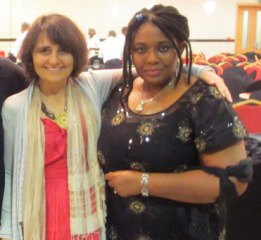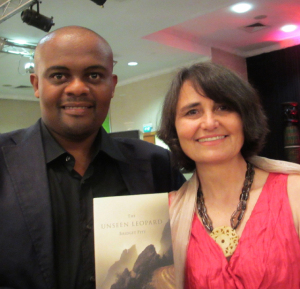A night out in Lagos
- bridget pitt
- Sep 9, 2012
- 4 min read
The Wole Soyinka Prize for Literature in Africa Award Ceremony, to give it its full title, was one of the most remarkable events that I have attended as an author. I turned out in my pink party frock, and assumed for several hours that I must be someone else, as a surprisingly large array of people thrust cameras in my face. (I;m pretty sure they also thought I was someone else. They’ll probably be quite despondent when they print out their pics and discover that I’m just a lesser spotted author, and not a rare bird of paradise.) In between the flashing cameras, and eating my goat soup, I was roundly entertained by speeches, music and dancing from the Crown Troupe and the masked saxophonist, Lagbaja.
I did not win the award, but lost to a worthy opponent, Sifiso Mbozo, for his sharply authored vignette Young Blood. The organizers kindly told me that The Unseen Leopard put up a convincing fight for first place, beating over 400 books. Young Blood is a compelling read, which scooped both the Sunday Times and the MNET awards on its release.
The Nigerians I met were all wonderfully generous, and made a good show of being just as eager to be photographed with me after I proved to be not-the-winner.
What really struck me about the event was how much literature is celebrated in Nigeria.
This was clearly a party that people wanted to attend, with an impressive line up of dignitaries including the ex president of Ghana; John Kufuor, Babatunde Fashola and Senator Ibikunle Amosun, Governors of Lagos and Ogun states respectively; Professor Wole Soyinka to mention just a few. The sponsors not only paid for my and Sifiso’s flights and accommodation, but also the $20 000 prize – impressive by our standards but dwarfed by Nigeria’s literature prize of $100 000. Nigeria clearly loves both books and authors, and consequently has produced a stable of very fine writers over the years. Definitely something South Africa can learn from – our local press and bookshops still seem a lot more willing to promote overseas titles. Local novels seldom make it onto Exclusive’s New Books stand, for instance – they usually scuttle straight for the “African Fiction” shelves.
I met some hugely inspiring people, including Sifiso Mzobe, and Promise and Azubike Ogoduchukwu. Promise is an author and poet, who has done sterling work to promote literature and reading in Africa through the Lumina Foundation as well as running an orphanage on the side

Professor Soyinka in person
was every bit as irreverent, articulate and acerbic as his writing suggests. He spoke about the threat to the libraries of Timbuktu by what he called “these throw-backs”, and decried the “anti-human” activity going on in our continent in the name of religion.
He challenged the Nigerian government, which has been criticized for over-accommodating the Islamic fundamentalist Boko Haram, to decide whether it was on the side of the “philistines or our common humanity”.
He also condemned the trend of sharia law to relegate women to second class citizens, “stoning women for giving their bodies to whomever they please, as if anyone has the right over someone else’s body.”
It was an evening I will never forget. And having the opportunity to experience the Lagos was something else - my ears are still ringing from the continuously blaring hooters and “shake your bum-bum” being played full volume on the car radio of our affable driver and guide, Azubike. How he managed to negotiate the Lagos traffic - there are almost no traffic lights and the only rule seems to be that the biggest vehicles get right of way - remains a miracle. I hope to go back some day to meet more of the erudite and creative literary community,
The Judges:
Eid Shabbir: Professor of literature and chair of African Studies, International University of Africa, Khartoum, Sudan
Prof. Olu Obafemi: Professor of English and Dramatic Literature, UniLag
Liesle Louw: award winning journalist, South Africa
Dr Awo Asiedu: Acting Director of the School of performing Arts, University of Ghana
Jonathan Moshal: Professor of Comparative Literature, Cote D’Ivoire.
Remarks made by the judges on The Unseen Leopard
The novel is a fascinating read, gripping and the themes are universal. They are so maturely handled that one gets drawn in. The language is graceful, apt and the dialogue is brilliant. It’s a wonderfully elegant piece that works its spell on the reader. It’s really witty with a savage humour that makes the book timeless and terrific.
It is difficult to find a novel with such a rhetorical strategy that weaves nature—animals, plants, fauna, hideous caves and vast waters to portray a subject of the quest for the cause, motive, and the culprit of the death of a triangularly loved deceased. It engages the subject of capitalism and national patriotism. The language exudes lyrical beauty with a rare economy of words.
It is captivating and mature. Pitt demonstrates in this novel a competent command of language, with a text spiced with flashes of humour.






Comments